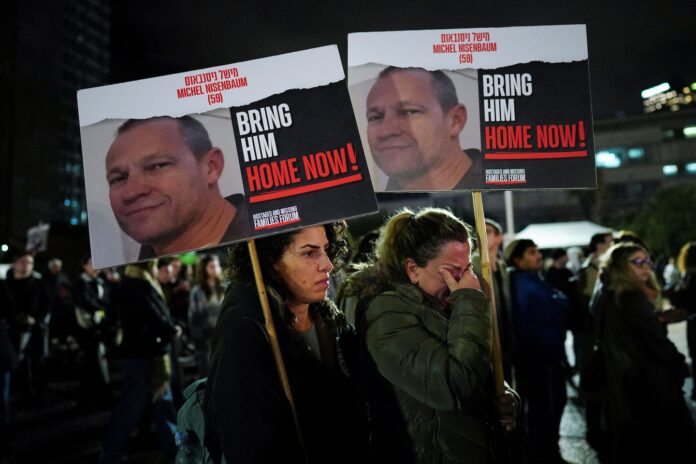The office of Israeli Prime Minister Benjamin Netanyahu said on Tuesday night that the agreement was reached with the participation of Mossad head David Barnea, who has been in Qatar to discuss “the issue of supplying medicines to the Israeli hostages.” It said that the medicines were purchased in France, according to a list prepared by Israel, and that Qatari representatives will be responsible for the delivery to their “final destination.”
“Israel insists that all the medicines reach their destination,” the statement said, without further explanation.
Philippe Lalliot, director of the French Foreign Ministry Crisis and Support Center, said in a radio interview on Tuesday that France had transferred the medicines to Qatar in diplomatic suitcases. He said that they would be brought to 45 hostages, none of whom were French nationals.
He added that French authorities were initially approached by families of the hostages months ago, and were given a list that included 85 hostages, including a number of whom who have since been released during a temporary cease-fire in late November, or since died in captivity.
Israel has for months demanded that medications be delivered to the more than 100 hostages still in Hamas captivity. The hostages include many who were injured in the Oct. 7 assault, others with severe medical conditions.
Hamas has barred the International Red Cross from visiting the hostages or transferring medicine.
Hamas released more than 100 hostages released in late November, though the way that they carried out the transfer has been sharply criticized by many Israelis after footage and testimonies indicated they were subjected to physical and verbal threats by locals as the exchange took place.
The deal, which was leaked to local media by the prime minister’s office on Friday, will also include the transfer of medicines to the most vulnerable areas for civilians in Gaza, where 15 hospitals are partially functioning and the health system is quickly collapsing as the fighting continues to rage.
Brett McGurk, President Biden’s coordinator for the Middle East and North Africa, was in Doha to discuss a possible deal for the release of captives, U.S. National Security Council spokesman John Kirby said Tuesday. Six Americans are believed to be among the hostages.
But it was France and Qatar, which has functioned as an intermediary between the world and Hamas, who came out publicly with the agreement.
Qatar brokered the release of two American hostages in October and oversaw a pause in fighting between Israel and Hamas in November that led to the release of more than 100 hostages from Gaza in exchange for more than 200 Palestinians serving sentences in Israeli prisons.
The latest deal, if successfully implemented, could provide lifesaving treatment to hostages who have now been held in Gaza for more than 100 days. It is not clear how much aid was intended for civilians in Gaza, where doctors are scrambling to tend to an ongoing stream of severe cases and international health officials have said that parts of the population are already existing in a state of famine.
“Some people have not eaten in days,” Olga Cherevko of United Nations Office for the Coordination of Humanitarian Affairs said in a video from southern Gaza on Tuesday. “The extent of needs is enormous.”
Families of the hostages have been meeting with Israeli, Qatari and international authorities with pleas that all measures possible be taken to secure their relatives’ release amid a sense of urgency over their fate during the ongoing conflict.
On Tuesday, Itay Svirski and Yossi Sharabi, who had been abducted on Oct. 7 from Beeri kibbutz, were declared dead by their kibbutz.
The news came a day after Hamas released a video purportedly showing the bodies of the two men, saying they had been killed after Israeli airstrikes hit the buildings they were being held in. Israeli military spokesman Daniel Hagari rejected the claim as a “Hamas lie,” adding that the building in which the two men were kept was not considered a target and was not hit by IDF forces.
Masih reported from Seoul, Timsit from London. Karen DeYoung and Sammy Westfall in Washington contributed to this report.



